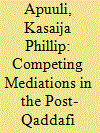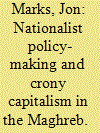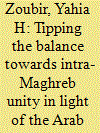| Srl | Item |
| 1 |
ID:
183954


|
|
|
|
|
| Summary/Abstract |
Since the end of the revolution that toppled the rule of Muammar Qaddafi in October 2011, Libya has never known peace. The country descended into civil war with different factions contending for control. In this milieu, the United Nations attempted to mediate an end to the crisis but its efforts have failed to gain traction partly as a result of other mediation initiatives undertaken by several European actors. Sub-regional and continental organizations, including the Arab Maghreb Union (AMU) and the African Union (AU) respectively, that should have taken the lead in the mediation have been absent. Meanwhile, continued fighting has hampered a mediated settlement, and terrorist groups such as the Islamic State (IS) and al-Qaeda have taken advantage of the situation to establish a presence in the country. In the end, rather than ending the crisis, Libya has provided the ground for competing mediation processes which have prolonged the crisis.
|
|
|
|
|
|
|
|
|
|
|
|
|
|
|
|
| 2 |
ID:
091822


|
|
|
|
|
| Publication |
2009.
|
| Summary/Abstract |
Twenty years on from the Arab Maghreb Union (UMA)'s creation, the European Community, which encouraged the move, has long evolved into the European Union, including old eastern European members which two decades ago seemed to be behind many UMA members in their potential to suck in Financial Direct Investment. While North African economies have continued to make significant progress, their structures and practices have not evolved nearly as quickly as seemed likely two decades ago. This article focuses on the political economy aspects of North Africa's perceived problems of drawing in investment and promoting regional integration: the domestic politics of the Euro-Med's Maghrebi partners, not only in the sense that 'nationalist' policy-making has a major impact on economic outcomes but also in the prevalence of crony capitalism across the region.
|
|
|
|
|
|
|
|
|
|
|
|
|
|
|
|
| 3 |
ID:
114942


|
|
|
|
|
| Publication |
2012.
|
| Summary/Abstract |
In the late 1980s, prospects for Maghreb integration were high; the process of integration reflected the aspirations of Maghreb states and societies. However, analysis shows that the process was merely a response to internal and external events of that period, namely, economic difficulties, 'fortress Europe', and the rise of radical Islamism. Following the Arab Spring, incessant calls for unity have re-emerged. Once again, these calls for unity, after a long period of tense relations, especially between Algeria and Morocco, have resulted from internal and external constraints. The threats to the incumbent regimes and/or the insecurity prevailing domestically and at the borders have compelled the Maghreb states to seek greater cooperation to overcome the hardships with which they are faced.
|
|
|
|
|
|
|
|
|
|
|
|
|
|
|
|